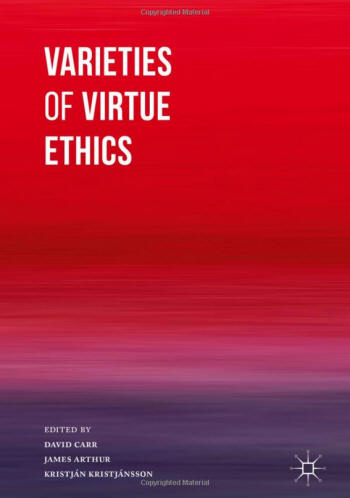Book Review
Varieties Of Virtue Ethics
Edited by David Carr, James ArthurKristjan Kristjansson
Palgrave
macmillan; 1st ed. 2017 edition (20 Dec. 2016)
ISBN: 978-1137591760
 In
the field of medical ethics, we tend to move from utilitarianism to
deontological ethics. But there are other options. For example, virtue
ethics emphasizes an agents's character as the central element in ethical
reflection rather than rules about acts (deontology) or the consequences
of the act (utilitarianism). While this book acknowledges the influence of
Aristotle in our understanding of virtue ethics, it notes that there are
other influences. It also looks at the influence that virtue ethics has
had on other fields, including psychology, sociology and theology.
In
the field of medical ethics, we tend to move from utilitarianism to
deontological ethics. But there are other options. For example, virtue
ethics emphasizes an agents's character as the central element in ethical
reflection rather than rules about acts (deontology) or the consequences
of the act (utilitarianism). While this book acknowledges the influence of
Aristotle in our understanding of virtue ethics, it notes that there are
other influences. It also looks at the influence that virtue ethics has
had on other fields, including psychology, sociology and theology.
For the purposes of this review, I will examine a few of the excellent papers published in the book. Richard Conrad is a Dominican and unsurprisingly his focus is on Aquinas. He notes that, like Aristotle, Aquinas held the cardinal virtues of prudence, justice, fortitude and temperance to be acquired. The more we practice them, the more habitual they become. In contrast, Aquinas says that the theological virtues of faith, hope and charity are directly given by God. Unlike Aristotle, Aquinas also believed in the existence of infused, that is, God-given, cardinal virtues. This is fitting as humans are created for a divine goal. If God brings sinners to repentance, the infused virtues will help them avoid serious sins. Such people will also build up acquired virtues. These will protect them from moral collapse. If they fall into sin and lose the infused virtues, the acquired virtues will still be at play and can assist in recovery. In the Catholic way of thinking, grace perfects nature. This would also mean that those who refuse to practice the acquired virtues are less likely to turn to divine things.
John Haldane discusses the variety of virtue ethics that were to be found in the medieval period. These include those that belonged to Plato, Aristotle, the Bible and the legal tradition. Moral theorizing as we understand today did not exist until the reception of Aristotle's ethical writings.
Andrew Pinsent asks whether a child acquires virtues in ways that were familiar to Aristotle. He suggests that virtuous actions by adults are encouraged by second person relatedness. Virtues are caught, not merely taught and children learn them from sdults, especially parents. To argue his case, he turns to researchers who have studied facial recognition in new born infants.
Julia Annas notes that Aristotelian virtue ethics has been studied more than any other. As an alternative, she examines what Nietzsche has to say on this topic and why one conception of virtue is chosen rather than another.
Andrew Sayers notes that, like her famous colleague Elizabeth Anscombe, Iris Murdoch was a critic of modern moral philosophy. They were both critical of the deontology and consequentialism that is prevalent in much of modern moral philosophy, seeing them as more similar than presumed. Murdoch's alternative was to build an ethics of virtuous character and moral psychology. Her foundations are more Platonic than Aristotelian. Her other inspirations come from Eastern mysticism, Buddhism and the reflections of Simone Weil.
Howard Curzer argues against three commonly held beliefs: that virtues are correlatives, that an act is right only if that is what the virtuous agent would do and that people who have one virtue will also have the other virtues.
Philip Gorski notes that the influence that Kant had on Durkheim has been noted. But Durkheim was also influenced by Aristotle, especially in his discussions on balance and eudaimonia. Perhaps Durkheim chose to distance himself from Aristotle in order to distinguish sociology from philosophy.
Mark Jonas argues that recent studies in virtue ethics in education tend to forget the influence that Plato had on the subject. His project of cultivating the virtues have been ignored and this is unfortunate as Plato offers insights to educators seeking to cultivate virtues in their students. Plato uses the character of Socrates to encourage us to emulate him in the pursuit of the virtues. Virtues are not acquired by mere contemplation of the forms but by habit.
In conclusion, this book is of tremendous importance to those of us who wish to develop our understanding of the varieties of virtue ethics on offer.
Reviewed by Dr Pravin Thevathasan
